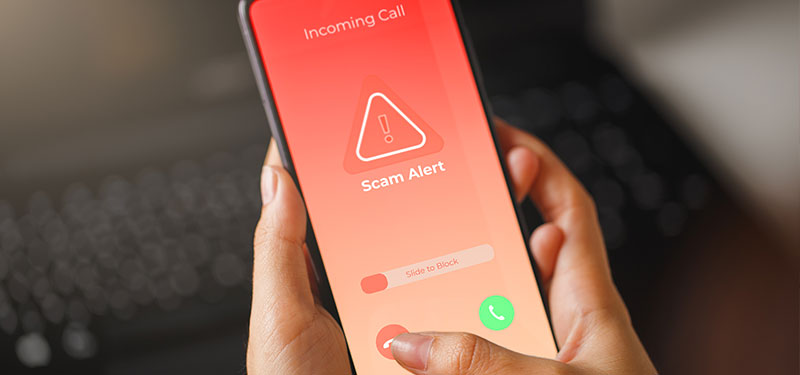About a month ago, I had NPR on the car radio as I drove home from work, half-listening while the hosts said something about President Biden and a recorded campaign call in advance of the New Hampshire primary.1 They played the ad, which got my full attention when I heard what was distinctly President Biden’s voice telling people … not to vote? The NPR hosts told the listeners repeatedly that the ad was fake, but I didn’t buy it. I remember thinking, “I know what the President’s voice sounds like, and it sounds just like that.”
Consider taking steps to protect your community against AI-generated scams and other cybercrimes affecting condominium associations.
I think it’s safe to assume that for almost every adult with a cell phone, robocalls and scam phone calls are an inevitable nuisance of everyday life. Personally, I have experienced one of the more prevalent scams among those of us with a phone in our pockets: about three calls a week from someone claiming to be my utility company. Robocalls like these are easy to fall for – not because we are gullible, empathetic human beings who want some foreign prince to get home to his family, but because an unpaid bill or noncompliance with a new gas meter regulation could have real life consequences.
Robocalls and phone scams are such a routine part of twenty-first century life, but they are more than just an everyday annoyance: they are harmful, potentially dangerous tools. It is concerning to know that our phone numbers are available for scammers and cybercriminals to find, and it can feel unsettling and invasive when someone calls your personal phone number, but you have no idea who they are.
That unease worsens when these robocalls become, for lack of a better word, personal. When robocalls started using software that would make it appear that the call was coming from a phone number similar to your own – same area code, maybe even just a number or two off from your personal number – I was receiving daily calls from phone numbers with the same first six digits as my own. These were, of course, not the real numbers of the scammers calling me; “neighbor spoofing” software generates a phone number similar to my own number to trick me into picking up.2
One day, shortly after graduating from college, I was at work when my cell phone rang – it was my brother calling. I silenced the call but worried why on earth my brother was calling me. My brother rarely, excuse me, never calls me. I quickly texted “what’s up?” and my brother replied “not much,” that he was just having dinner. I asked why he called, and he said he hadn’t. I looked back at my missed calls to make sure I wasn’t going crazy, and there it was, a missed call from my brother. I instantly remembered all the robocalls I had been getting; whatever software the scammers were using to generate those numbers had spat out my brother’s phone number, which shared the same first six digits as my own.
The experience was unsettling, but mostly felt like a fluke. Only recently, I learned about a new way that cybercriminals are intentionally using loved ones to target victims – through AI-generated voice cloning. Recently, families began reporting phone calls that mimic the voice of a loved one in danger. The calls come from unknown numbers, but the voice on the other end of the line is a friend or family member with an urgent, distressing message about an accident or crime. The caller might say that they had been in a car accident, that they had been robbed, or even that they had been kidnapped. There is, of course, an emotional component to these scams; victims are more likely to send money to a friend or family member in need. There is also a logical dichotomy at play; it may seem weird that a spouse, child, or sibling would ask for a gift card, wire transfer, or cryptocurrency in this urgent situation, but the victim hears their spouse, child, or sibling’s voice on the other line – how could it be anyone else?
According to a 2023 study by McAfee, “three seconds of audio is all it takes.”3 Cybercriminals pull a person’s voice from YouTube, TikTok, Instagram reels, and podcasts, and input the voice sample into an AI voice cloning tool. With just three seconds of audio, these tools can produce a voice clone with “stunning accuracy,” and victims are not likely to be able to tell the difference between a voice created by an AI cloning tool and the real thing.
Applications to Real Estate and Condominiums
The real estate industry has been targeted by robocalls and phone scams for years. However, the involvement of players in the real estate market – real estate companies, condominium associations, and property managers – is a two-way street.
Phone scams often target victims in their capacities as homeowners by posing as renters, listing brokers, contractors, and homeowners’ associations. One particularly harmful scam involves robocalls to financially stressed homeowners, offering them deceptive services or mortgage terms.4 Another commonly reported scam involves a homeowner contacted by someone posing as a contractor, offering to discuss home improvements, remodeling loans, or “safety concerns.” 5
Some of these scams target community associations in particular. In one case, victims reported receiving calls from scammers claiming they are with the homeowner’s association and demanding that the homeowner transfer money for work that is allegedly required to bring the property into compliance with HOA standards.6 With the help of AI, scammers are able to impersonate someone acting on behalf of an association and extort members of the community based on this imitation of authority. Additionally, with the availability of personal information on the internet, scammers can use AI to adapt their common, generic schemes and make them “smarter” to target victims. For example, a traditional phone scam involving a fake insurance policy or an uncollected payment could incorporate the information that someone lives in a condominium association. Scammers can customize their tactics by purporting to act on behalf of the association, claiming that the association is requiring a new insurance policy or that the victim is delinquent on payments.
Real estate companies, condominium associations, and property management companies are negatively impacted by these scams, directly and indirectly. One of the most prevalent scams in the real estate industry comes from cybercriminals responding to rental and real estate listings. The rise in AI-generated, fake property listings has led to distrust of real estate brokers and property managers. In situations where residents and tenants fall victim to common scams, property managers are not necessarily the targets, but the inability of a property manager to remedy the situation negatively impacts the relationship between the property manager and the owners of the units they manage. Fraud from phone scams can damage a property manager’s reputation, resulting in time and money lost.7
On the other side of the road, however, are all the benefits that robocall technology and AI software can provide to condominium associations and property managers. Larger condominium associations use AI chatbots to address resident problems such as account inquiries and service requests. Property managers may use robocall software to send information and announcements to the entire community. Advances in technology and artificial intelligence provide useful tools for communication and cooperation among condominium owners and property managers alike. However, safety and security concerns require a balance between the convenience of AI and caution against those who use AI with malicious intent.
As artificial intelligence technology advances, it is on track to become commonplace across all industries. However, it is important to be cautious that just because an AI-generated product is realistic and convincing, it is not necessarily authentic. Before the rise of AI voice cloning, it would be relatively straightforward for a condominium unit owner to verify whether the robocall they received was from condominium management, or a scam – simply contact the management company, the board, or the property manager to verify the purpose of the call. Now, however, if a unit owner receives a call or voicemail from someone who says they are the property manager, member of the condominium board, or other unit owner, and the caller sounds just like the property manager, board member, or neighboring unit owner, the inclination to verify the call might just not cross your mind.
With the advent of AI voice cloning, a scam involving the voice of someone you know may go beyond demands for money. Perhaps a unit owner will pick up the phone one day to a familiar voice telling her not to vote, or who to vote for, in the upcoming board elections. Interference in a condominium board’s elections does not have quite the same stakes as, for example, an alleged attempt to suppress votes in a presidential primary race, using an imitation of the President of the United States’s voice. Nevertheless, important decisions within condominium communities involve consequential outcomes which affect everyday life at the association and, to be candid, anyone can use these voice cloning tools. There are more than a dozen AI voice cloning tools available on the internet for free, and all it requires is three seconds of a person’s voice to replicate.
Consider taking steps to protect your community against AI-generated scams and other cybercrimes affecting condominium associations.
1. Set a verbal code word for the community. If a member of the community receives a phone call from an unknown number, in which the caller claims to be acting on behalf of the condominium association, the recipient can request the code word. This will provide an immediate indication whether the caller is authorized to communicate on behalf of the condominium association, or a scam.
2. Pay attention to red flags. Robocalls and scams that attempt to extort money from the victim usually request payment in an untraceable form, such as gift cards, wire transfers, or cryptocurrency. Remind members of your community that even if the caller sounds like someone they know, there may be other signs that this is a scam.
3. Communicate your community’s chosen AI tools. Community members may be more likely to fall for a scam if they are not aware whether the communication comes from a software tool legitimately used by the association. Ensuring that all members of the community know what phone numbers are attached to condominium management and what AI software the association might use can help prevent individuals from responding to communications from other sources. Relatedly, if your association only communicates with members by telephone, mail, and email, make sure the community members know that any texts or social media communications are not authorized by the association.
2Caller ID Spoofing, FCC, March 7, 2022.
4FCC Takes on Robocall Scam Targeting Homeowners, American Land Title Association, January 31, 2023.
6Greenville police warn about Homeowner’s Association scam, WITN, September 10, 2021.


